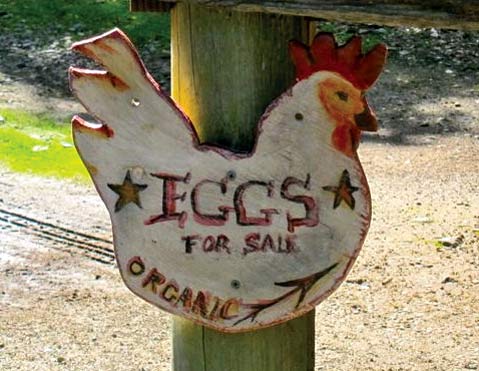The Egg Woman
The Cluck of Chickens, the Crow of Roosters

Jeanne lives in a little house up the canyon with a driveway so steep your calves start to ache before you’ve reached the top. I can hear her chickens whenever I go by, and sometimes their crowing and squawking carries on the wind into my own backyard. It’s a lunatic sound, and I love it. Jeanne started with seven chickens but inherited more, and they have multiplied tenfold. They are all hens, except for Elvis, Wayne, and Romero, three stereotypically cocky roosters certain of their place in life. I see them strutting around ridiculously with their outlandish feathers, and I cannot help but laugh at the sight. Jeanne’s house, which has always been the scene of impressive one-woman industry, has thus also become a madcap zone where clucks and chuckles hang in the air, punctuated by sporadic rooster screams. There is something about chickens that makes me not take myself so seriously.
Jeanne sees the humor of them, too, but mostly she sees the eggs. “What a beautiful, perfect creation,” she will say, cupping one carefully in her hand, or marveling at the size and smoothness of another. “A miraculous thing. Sustenance in a shell.” She has set up a sign and an honor box just outside the gate to her property, and for five dollars a dozen, neighbors can buy fresh eggs. They are superior eggs — the flavor fresher, the yolks more yellow. They are somehow the essence of egg, and this is a good thing, even if you didn’t know you had been missing it.
It’s a lot of work, keeping this egg operation going. One summer Jeanne designed a large and comfortable chicken apartment so the girls, as she calls them, could settle more safely and comfortably at night. Two days after it was finished, the infamous Gaviota winds kicked up, and an old oak tree weakened at the core by fire 50 years earlier finally snapped and crashed directly onto the brand-new coop. The coop was smashed beyond repair, and a couple of hens were crushed. Jeanne took a deep breath, cleared up the mess, and rebuilt a little farther from the trees. “Chicken Little was right that time,” she said.
That’s the way it is around here. There are weeds to whack and brush to clear, fallen trees to be removed, everything demanding maintenance and tending. Water needs pumping, the fence is broken, the phone line unreliable. Rodents occupy the hidden crannies of dwellings and car engines, and there’s dust — the outside is forever getting in. Rural life is a work always in progress and a labor of love.
But then there is the wonder. Sometimes I see Jeanne working in her garden, and we shout across the creek the way housewives used to shout over backyard fences as they hung their laundry on the line with wooden clothespins, except that we’ll be talking about secret chanterelles, or wild strawberries on the ridge, about tides turning, hens laying, and last night’s orange moon. She tells me that she glimpsed the bear that’s been eating the apricots and that her brand-new chickens, hatched in Iowa, are now ensconced in their California digs. A few feathery girls wander by, Romero crows, and I wedge a carton of eggs into my backpack and carefully pedal home.



